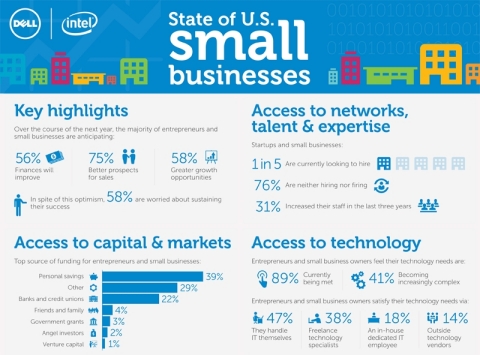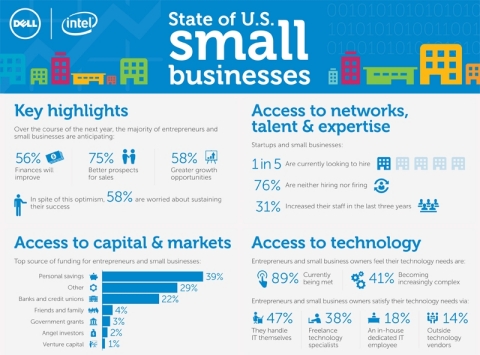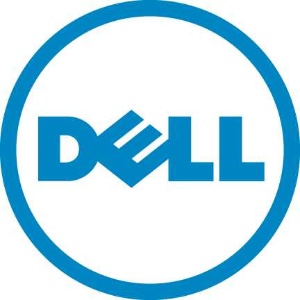ROUND ROCK, Texas--(BUSINESS WIRE)--Research released by Dell and Intel today reveals that startups and small businesses in the United States are focused on growth, primarily domestically, and are increasingly investing in technology to help them scale. Entrepreneurs and business owners are optimistic and maintain a positive future outlook, but believe that there is more government could be doing to support them, especially from the state and national level. The findings are part of a comprehensive report that explores the state of U.S. small business and entrepreneurship and identifies what can be done to address key challenges and barriers to growth.
To gain a deeper understanding of the small business experience at a local level, Dell conducted a nine-city Small Business “Think Tank” Tour over the last 12 months, hosting interactive, participant-led discussions with entrepreneurs, small business owners and local leaders in each metro area. The report combines these expert opinions and in-person dialogue with Dell- and Intel-commissioned research to provide a complete overview of the prospects and priorities of national startups and small businesses, and how these perspectives vary from city to city.
Across all markets, entrepreneurs and small business owners were identified as having three primary needs: Access to Capital and Markets; Access to Networks, Talent and Expertise; and Access to Technology. Cities in the analysis were chosen for having a significant index of their population owning or working for small businesses, and included Atlanta, Miami, the San Francisco Bay Area, Chicago, the Los Angeles and Orange County Area, Austin, Philadelphia, Seattle and Boston.
Click here to access the full report. Detailed research findings and event summaries by city can be found here under the Entrepreneurship tab.
Key findings illustrate that entrepreneurs and small business owners are:
- Maintaining their optimism: Over the course of the next year, more than half of entrepreneurs and small business owners expect finances to improve (56 percent), and most expect better prospects for sales (75 percent) as well as greater growth opportunities (58 percent).
- Focused on growth: Nearly half of respondents are planning to grow their companies in the near future (48 percent), while a significant percentage is focused on long-term growth (38 percent).
- Satisfied with tech: Most startups and small businesses report being satisfied with how their technology needs are currently being met (89 percent). Despite this, a significant percentage report that their technology needs are becoming increasingly complex (41 percent).
- Staying domestic: The majority of U.S. startups and small businesses see greater growth opportunities at home than abroad (84 percent).
- Wary of the national economy: Nearly all startups and small businesses cite concern with the U.S. economy’s impact on small business growth (91 percent) and indicate low expectations for improvements to inflation (28 percent), interest rates (33 percent) and the global economy (39 percent).
- Receiving support locally: Respondents feel that their local government is more supportive of small business growth (50 percent) than their government at the state (40 percent) or national level (33 percent) and consider professional organizations (68 percent) and their local Chamber of Commerce (64 percent) to be the most crucial support pillars for the small business community.
Based on research findings and conversations with startups and small businesses over the last year and consistent with the Technology CEO Council (TCC) recommendations, Dell believes that policymakers, together with big business, should focus on the following areas to help them overcome current obstacles to growth:
- Improving Access to Capital and Markets: Although obtaining capital remains a common pain point, the current regulatory environment is causing small business owners to look elsewhere from government lending for financing. Policymakers should impose reasonable fiscal controls on government spending and work to reform America’s corporate tax system to be globally competitive by adopting a territorial tax system with lower rates and permanent, effective research incentives.
- Improving Access to Networks, Talent and Expertise: Competition for top talent is high among startups and small businesses, especially at executive levels and in the fields of science and technology. To expand the talent pool and help empower the next generation of entrepreneurs, policymakers can work to improve the quality of K-12 STEM education and engage more students in STEM learning at a younger age, increase U.S. college graduation rates, and remove barriers to immigration for skilled workers.
- Improving Access to Technology: Technology will continue to play a larger role in enabling the success of startups and small businesses as it levels the playing field, making it easier for them to compete with large companies, having to hire fewer employees and automating routine tasks. Policymakers can encourage innovation and increase access to technology by maintaining robust national investments in R&D (3% of GDP), and investing in next-generation infrastructure, including telecom, energy, transportation and healthcare.
In addition to leading the multi-city tour, Dell has engaged in discussions with policymakers at the federal and state levels to help create regulatory environments that remove obstacles to entrepreneurial success and make government a partner in accelerating entrepreneur and small business success and job creation. Dell continues to advocate for the creation of the “Entrepreneur-in-Residence” (EIR) in government, bringing true entrepreneurs into government to serve as advocates for entrepreneurs to work for change in government regulatory processes and programs.
Quotes
“Entrepreneurship and job creation have rightfully dominated the national conversation in recent years, but we also need to make sure that entrepreneurs and young companies are getting the support they need and that local priorities aren’t overshadowed by national headlines,” said Scott Case of Startup America Partnership. “Entrepreneurs are by nature optimistic, but they can’t succeed all on their own. To continue to drive forward the entrepreneurial advantage we enjoy in this country requires a collaborative effort between policymakers, academics, nonprofits, major corporations and private sector companies.”
“While possessing a bright outlook overall, entrepreneurs and small business owners remain uncertain about the future ahead. To compete in today’s global landscape, they need technology to innovate, but it’s not the only thing they need,” said Ingrid Vanderveldt, Entrepreneur in Residence at Dell. “Turning a great idea into a successful business also requires access to financing, networking and knowledge.”
“In addition to access to vital resources, entrepreneurs need support to navigate government regulations so they can focus on innovation,” said Rep. Mike Honda. “There is much that U.S. policymakers can do today to help American entrepreneurs and small business owners compete globally, which would encourage job creation and foster a favorable economic climate for growth, innovation and competitiveness. The EIR program is an effort to source these solutions more broadly.”
Methodology
Dell and Intel commissioned research from Penn Schoen Berland (PSB) to better understand the concerns, challenges and needs of the small business community, to determine how technology may increase the success of these businesses, and to inform conversation on the future of America’s small businesses. Over the course of 2012 and 2013, PSB conducted 941 interviews in 2012 and 2013 among small businesses decision-makers, from companies with 1 to 99 employees, in the following U.S. cities: Miami, Atlanta, Chicago, the San Francisco Bay Area, Los Angeles-Orange County, Austin, Philadelphia, Boston and Seattle.1
Additional Information:
Link to
Infographic
Link
to Whitepaper
Link
to Small Business Think Tank page
About Dell:
As the visionary outcome of a true entrepreneur, Dell (NASDAQ: DELL) is committed to helping small and medium businesses grow and better serve their customers by drawing greater value from technology. For more information, visit the Dell Center for Entrepreneurs at http://www.dell.com/entrepreneur.
1 Total number of small business decision-makers N=941 (MOE ± 3.19%); Margin of error by city – Miami N=100 (MOE ± 9.8%), Atlanta N=100 (MOE ± 9.8%), Chicago N=200 (MOE ± 6.93%), San Francisco N=100 (MOE ± 9.8%), Los Angeles-Orange County N=71 (MOE ± 11.63%), Austin N=69 (MOE ± 11.80%), Philadelphia N=100 (MOE ± 9.8%), Boston N=101 (MOE ± 9.75%), Seattle N=100 (MOE ± 9.8%)




